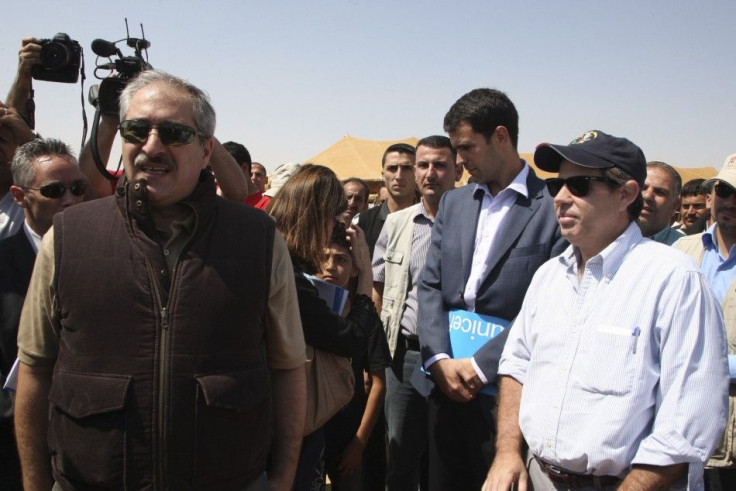Refugees In Jordan Tell Stories Of Torture, Harrowing Escape From Syria's Civil War

"Look, it still bleeds," Marwan Al Mehemed said simply, lifting his robe to show what he said were wounds inflicted by prison guards during torture sessions in Dara'a. Bloodstained pants covered his injuries. He is a Syrian refugee, a fugitive from the civil war raging in his homeland, just across the border from where he stood now in a refugee camp in Jordan swelling with Syrians like himself.
Al Mehemed, speaking in mid-August, said he was 48 years old and used to run a small construction business in Homs before the war and that he had just made it it to northern Jordan's Zaatari refugee camp.
For many at Zaatari, it was a short, desperate flight to safety across the border from Dara'a, the city where the revolt against President Bashar Al-Assad began 18 months ago.
The camp, set up at the beginning of August, currently houses more than 7,000 of the 170,000 Syrian refugees the United Nations estimates are scattered throughout Jordan, Lebanon and Turkey. And, the world body warns, those numbers are rising fast.
Marwan fled his home in Homs' Bab Amr neighborhood, which was nearly obliterated in a Syrian army assault last year, pounded by heavy artillery fire.
"In December, a wall collapsed over the youngest of my six children, as the house was shelled. He died later at the hospital. He was four and a half years old," Marwan recalled, standing next to a sand-colored tent set up by the UNHCR, the U.N.'s High Commissioner for Refugees.
Besides haunting memories, his trek to the refugee camp left him with only the clothes on his back -- and those were donated. He was nabbed by regime forces while trying to flee the country and held as a suspect opposition member.
"We hanged on until July, then we decided to flee south, staying at relatives' on the way, but we were arrested at a checkpoint," Marwan said. "My wife and kids were released after two days and managed eventually to cross into Lebanon. I was sent to prison in Dara'a."
He was held for 13 days, he said, during which he was sodomized five times by guards, before being transferred to a facility in Damascus. There, some of Marwan's fellow inmates were taken to a basement shooting range and never came back to the cell.
"I endured it until a judge ruled that I had done nothing against the regime and ordered me released," he said. As the court hearing was held back in Dara'a, once free, Marwan managed to contact the rebels fighting under the flag of the Free Syrian Army and to surreptitiously cross the border into Jordan.
According to several refugees in the Zaatari camp, the FSA controls most of the rural areas outside Dara'a, and the only way out of the country is to be escorted by the rebels on a rough six-hour southward trek, ending with rebels handing civilians over to the Jordanian border guards. It's a perilous journey: There have been several incidents of Syrian soldiers opening fire on people trying to leave the country.
Walking the sandy paths along neat rows of dozens of tents in the camp, one could enter any of them at random and hear similar tales of horror from any family, single man or young boy who reached this patch of Jordanian desert, less than six miles from the border, an hour north of Amman.
"We provide a place, blankets, electricity, food and water to the 400 to 500 new people who cross the border every night and to the refugees who are being moved from the facilities used so far in the city of Ramtha," explained Mahmoud Al Amush, the manager of the camp, which is supervised by the Jordan Hashemite Charity Foundation.
Eventually, as the civil war drags on, the camp may turn into a city of more than 100,000 people. "We expect to reach the maximum capacity of 125,000 people and to be able, with the help of many international donors, to cope with the situation for at least six months," he added.
But that prospect greatly depends on how the Syrian crisis will unfold and poses the threat of Zaatari becoming yet another de-facto permanent refugee settlement in Jordan. Authorities in Amman are already concerned over the now almost 2 million Palestinian residents in Jordan, who fled to the kingdom after Israel's creation in 1948 and, eventually, ended up outnumbering the native population.
While the tents still cover the camp, people are gradually being transferred into temporary mobile housing, like that of 50-year-old Muhammad Abu Kassam and his family of three.
Kitchen tools and some food are stored in a corner of the tiny white room. A young woman sitting on a mattress nurses a 2-year-old boy and newborn girl.
"I had to leave, to protect them," Muhammed said. He has wrapped a scarf around his face to hide his identity, so camera crews and photographers roaming the camp won't inadvertently expose him to the regime in Damascus.
"The situation in my village was terrible," he said. "Soldiers and militias were killing everybody with guns and [other] weapons -- farmers in the fields, women and children inside the houses. My two oldest sons stayed there, though, to fight a jihad for our land and our homes. And I will go back when Assad falls," Muhammed promised.
Like Muhammed, everyone here wants to go back to Syria one day. But meanwhile, despite the sandstorms, broiling heat and what amounts to a detention system under which one can only leave the camp with a written guarantee from a Jordanian citizen, the refugee camp's occupants say that, compared to their homeland today, Zaatari feels like heaven.
© Copyright IBTimes 2024. All rights reserved.




















